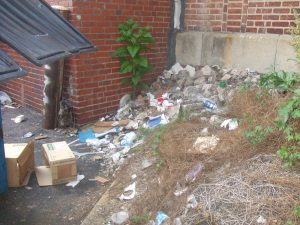
Empty 40-ounce bottles of Old English make a loud cracking sound as they roll down Kensington Avenue. Devoured bags of Doritos and old, worn-out clothes pile up on the corners of the streets, while people stroll by ignoring the massive amounts of trash that is building up around them.
Many people of Kensington have lost hope. In an area, which suffers dramatically from massive job losses and poverty, why should they care that the trash is piling up around them? Kensington suffers daily from crime and drugs, making trash last on the agenda list of things to worry about. In all, trash doesn’t kill, so there is no serious need to take care of it.
But is there?
Jacelyn Blank, secretary of the East Kensington Neighbors Association (EKNA), believes that cleaning up the community is as serious a need as not allowing gun ownership in this very violent area. To her and the members of the EKNA, polluted communities result in neighborhoods full of crime and violence. While it may sound naïve, the people of the EKNA believe that eliminating the trash on the streets will result in a feel good attitude and therefore a better community.
Blank understands the situation. “In areas like these, there is not a positive vibe. There is a lot of violence and a lot of drugs.” Blank continues with a look of despair, “Many citizens don’t know where to begin or they are scared to.”
But with that in mind, Blank pushes forward because to her cleanliness is the key to making a better community. She and other members of the EKNA formed the Beautification Committee, which is devoted to cleaning up the streets of East Kensington. They’ve recently dedicated time into what they call the “Trashcan Project,” which is the movement of placing trashcans on numerous streets scattered throughout East Kensington, in hopes that people will use them.
While it seems too simpleminded to work, the project actually has had a profound affect on the Kensington community.
The goal of the project is to provide trashcans and trash bags, nominate a block captain to keep an eye on the cans and hope that in the end, less trash will fall upon the streets. As a result, Blank along with all the members of the EKNA, were pleased to see a positive result.
“The hope is to motivate the community to keep it clean,” Laura Ertwin, former Secretary of the EKNA states. Ertwin warmed the seat of secretary for five years before handing the position to Blank.
Ertwin explains that before the “Trashcan Project,” it was very common for people to use storm drains to dispose their trash. While many people may still use the storm drain, at least the EKNA has provided the resources that the community desperately needs.
Ertwin answers quickly when asked why she thinks cleaning up the community is significant. “It gives people pride in their neighborhood. People don’t care how their house looks when all the community brings in is drugs and prostitution.”
But Ertwin boldly says: “You’re going to have less crime and less negative things going on in your neighborhood, when the community looks better. People such as drug dealers and prostitutes will feel uncomfortable.”
While it seems like the people in the community simply just don’t care anymore, in reality many just don’t know what to do.
“Ignorance is a very strong word, but that does not mean your stupid… You have to realize that not everyone knows how to clean up,” Blank explains.
According to the lack of education in schools, many people honestly do not have the skills or knowledge to clean up after their fallen communities. Blank and Ertwin both agree that education is the key to better communities.
Blank hopes for high schools to enhance their volunteering demands. She believes that in order to graduate, students should have to fulfill a certain volunteer requirement.
Ertwin pushes for the education to start even younger. She believes that you need to educate kids at a young age not to litter and why overall it is beneficial.
When a neighborhood suffers from drugs, crime and violence, it seems unlikely that people are willing to open up to their neighbors. Much like a bus ride, people try to avoid eye contact and keep their head down. By avoiding contact, a person can hide from confrontation, which is a caution that the Kensington residents would much rather take.
Stan Gable, another member of the EKNA, believes that coming in contact with your neighbors is most important. Gable, who helps form the EKNA’s monthly cleanup says, “We get out, we talk to the neighbors and it gives us a chance to get to know those living in the community.”
Ertwin agrees. “When you are outside cleaning, you get to know your neighbors. It is strengthening the neighborhood as a whole.”
Along with Gable and Ertwin, Gable believes that cleaner streets benefit the community in more than just the visual aspect. “With cleaner streets, there is less crime. Once clean, people are less likely to litter again.”
Sometimes all it takes is a glimpse of hope. Gable says: “This was a really rough neighborhood with the factories closing. Older neighbors who have given up, have started to gain hope again.”
The East Kensington Neighbors Association is an organization dedicated to enhancing the quality of the community. To get involved or for more information, visit the Web site at https://ekna.wordpress.com/.



Be the first to comment